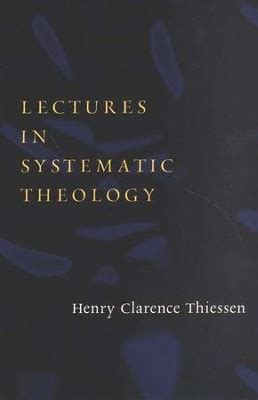A Quote by Henry Clarence Thiessen
Man's will is free in the sense that man can choose to do anything in keeping with his nature . . . Man's will is not free in that he is limited to his nature
Related Quotes
Man has reason, discrimination and free-will such as it is. The brute has no such thing. It is not a free agent, and knows no distinction between virtue and vice, good and evil. Man, being a free agent, knows these distinctions, and when he follows his higher nature, shows himself far superior to the brute, but when he follows his baser nature can show himself lower than the brute.
If I'm among men who don't agree at all with my nature, I will hardly be able to accommodate myself to them without greatly changing myself. A free man who lives among the ignorant strives as far as he can to avoid their favors. A free man acts honestly, not deceptively. Only free man are genuinely useful to one another and can form true friendships. And it's absolutely permissible, by the highest right of Nature, for everyone to employ clear reason to determine how to live in a way that will allow him to flourish.
But neither life nor happiness can be achieved by the pursuit of irrational whims. Just as man is free to attempt to survive in any random manner, but will perish unless he lives as his nature requires, so he is free to seek his happiness in any mindless fraud, but the torture of frustration is all he will find, unless he seeks the happiness proper to man. The purpose of morality is to teach you, not to suffer and die, but to enjoy yourself and live.
To free a man from suffering, he must be set right, put in health; and the health at the root of man's being, his rightness, is to be free from wrongness, that is, from sin. A man is right when there is no wrong in him. I do not mean set free from the sins he has done: that will follow; I mean the sins he is doing, or is capable of doing; the sins in his being which spoil his nature — the wrongness in him — the evil he consents to; the sin he is, which makes him do the sin he does.
Nature is man's inorganic body -- that is to say, nature insofar as it is not the human body. Man lives from nature -- i.e., nature is his body -- and he must maintain a continuing dialogue with it is he is not to die. To say that man's physical and mental life is linked to nature simply means that nature is linked to itself, for man is a part of nature.
He is not the soul of Nature, nor any part of Nature. He inhabits eternity: He dwells in a high and holy place: heaven is His throne, not his vehicle, earth is his footstool, not his vesture. One day he will dismantle both and make a new heaven and earth. He is not to be identified even with the 'divine spark' in man. He is 'God and not man.
In the latter sense, a man has a property in his opinions and the free communication of them. He has a property of peculiar value in his religious opinions, and in the profession and practice dictated by them. He has an equal property in the free use of his faculties and free choice of the objects on which to employ them. In a word, as a man is said to have a right to his property, he may be equally said to have a property in his rights.
Capitalism demands the best of every man - his rationality - and rewards him accordingly. It leaves every man free to choose the work he likes, to specialize in it, to trade his product for the products of others, and to go as far on the road of achievement as his ability and ambition will carry him.
One of the most revolutionary concepts to grow out of our clinical experience is the growing recognition that innermost core of man's nature - the deepest layers of his personality, the base of his 'animal nature' - is basically socialized, forward-moving, rational and realistic... He is realistically able to control himself, and he is incorrigibly socialized in his desires. There is no beast in man, there is only man in man.
Man is man because he is free to operate within a framework of his destiny. He is free to deliberate, to make decisions, and to choose between alternatives. He is distinguished from animals by his freedom to do evil or to do good and to walk the high road of beauty or tread the low road of ugly degeneracy.


































